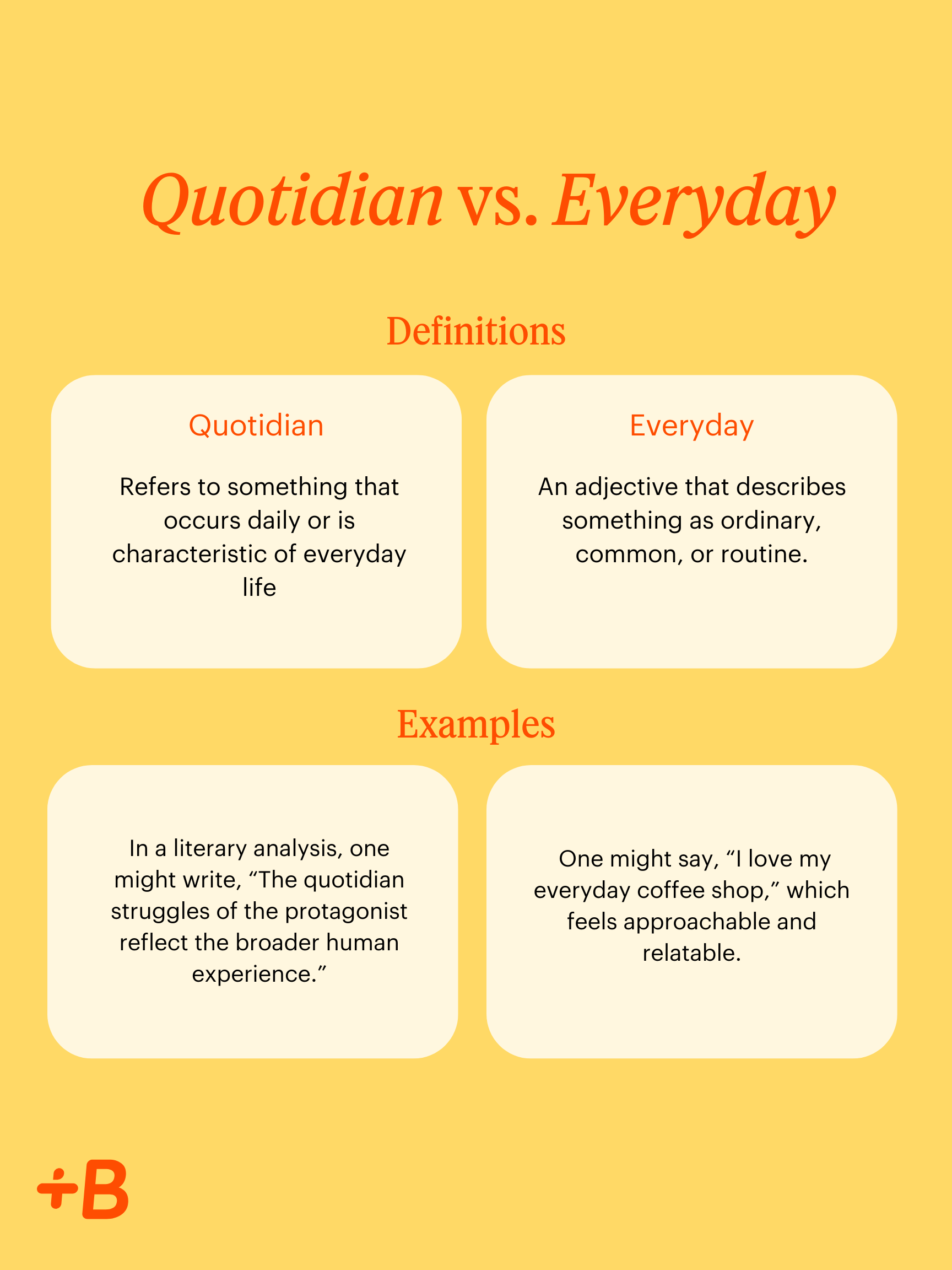In the realm of language, precision is key. Among the many terms that often cause confusion, “quotidian” and “everyday” are some of the biggest culprits. While both relate to the concept of daily life, they carry distinct meanings and usages that can enhance our communication. Understanding these nuances not only enriches our vocabulary but also sharpens our ability to express ourselves clearly.
Many people also mistakenly interchange “everyday” and “every day,” further complicating their understanding. We’ll be delving into the definitions, differences, and appropriate contexts for using “quotidian” and “everyday,” helping you navigate these terms with confidence.
What Are The Definitions Of Quotidian and Everyday?
Quotidian
The term “quotidian” refers to something that occurs daily or is characteristic of everyday life. It originates from the Latin word “quotidianus,” which means “daily.” In contemporary usage, “quotidian” often conveys a sense of routine or normalcy, but it can also carry a slightly more formal or literary tone. For example, one might say, “The quotidian tasks of life often go unnoticed,” highlighting the mundane yet essential activities that fill our days. Another example could be, “Her quotidian routine included a morning jog and a cup of coffee,” emphasizing the regularity of her actions.
Everyday
In contrast, “everyday” is an adjective that describes something as ordinary, common, or routine. It is used to characterize things that are typical or unremarkable in daily life. For instance, one might say, “He wore his everyday clothes to the meeting,” indicating that the attire was not special or formal. Another example is, “Everyday problems can often feel overwhelming,” suggesting that these issues, while common, can still pose challenges. The distinction here is that “everyday” emphasizes the ordinary nature of something rather than its frequency.

The Usages of Quotidian and Everyday
Understanding when to use “quotidian” versus “everyday” can significantly enhance your language skills. “Quotidian” is often more appropriate in formal or literary contexts, where a touch of sophistication is desired. For example, in a literary analysis, one might write, “The quotidian struggles of the protagonist reflect the broader human experience.” Here, the term adds depth and a sense of gravity to the discussion.
On the other hand, “everyday” is better suited for casual conversations or informal writing. For instance, one might say, “I love my everyday coffee shop,” which feels approachable and relatable. Additionally, phrases like “everyday life” or “everyday activities” are commonly used to describe the routine aspects of living. Recognizing these contexts will help you choose the right term for your intended message.
A common point of confusion also arises between “everyday” and “every day.” While they sound similar, they serve different grammatical functions. “Everyday” is an adjective, as mentioned earlier, used to describe something ordinary. In contrast, “every day” is an adverbial phrase that means “each day” or “daily.” For example, one might say, “I go for a walk every day,” which indicates a daily activity. Conversely, “I enjoy my everyday walks,” suggests that the walks are a routine part of life but does not specify frequency. This distinction is crucial for clear communication, as misusing these terms can lead to misunderstandings.
Differences Between Quotidian and Everyday
While both “quotidian” and “everyday” relate to daily life, they convey different nuances. “Quotidian” often implies a deeper reflection on the mundane, suggesting that there is significance in the routine aspects of life. In literature, for example, authors may use “quotidian” to evoke a sense of familiarity or to highlight the beauty in the ordinary. A sentence like, “The quotidian rhythm of the city was both comforting and chaotic,” illustrates this duality.
In contrast, “everyday” emphasizes the commonplace nature of something without necessarily imparting any deeper meaning. For instance, saying, “She faced everyday challenges at work,” implies that these challenges are typical and expected. This distinction is essential for effective communication, as it allows speakers and writers to convey their intended tone and message accurately.
Synonyms of Quotidian and Everyday
Quotidian
Several synonyms capture the essence of “quotidian.” These include:
- Daily: Emphasizing the frequency of occurrence.
- Routine: Highlighting the regularity of actions.
- Habitual: Suggesting a pattern or custom in behavior.
Everyday
Similarly, “everyday” has its own set of synonyms, such as:
- Ordinary: Denoting something that is not special or remarkable.
- Commonplace: Suggesting that something is widely encountered or familiar.
- Usual: Indicating something that is typical or expected.
Understanding the distinctions between “quotidian” and “everyday” is crucial for effective communication. While both terms relate to daily life, they serve different purposes and convey unique nuances. By mastering these terms, you can enhance your vocabulary and express yourself more clearly. Whether you’re writing a formal essay or engaging in casual conversation, knowing when to use “quotidian” or “everyday” will elevate your language skills. So, the next time you find yourself reaching for these words, remember their meanings and contexts, and let your language shine!
This article was created with the assistance of AI.
Comment